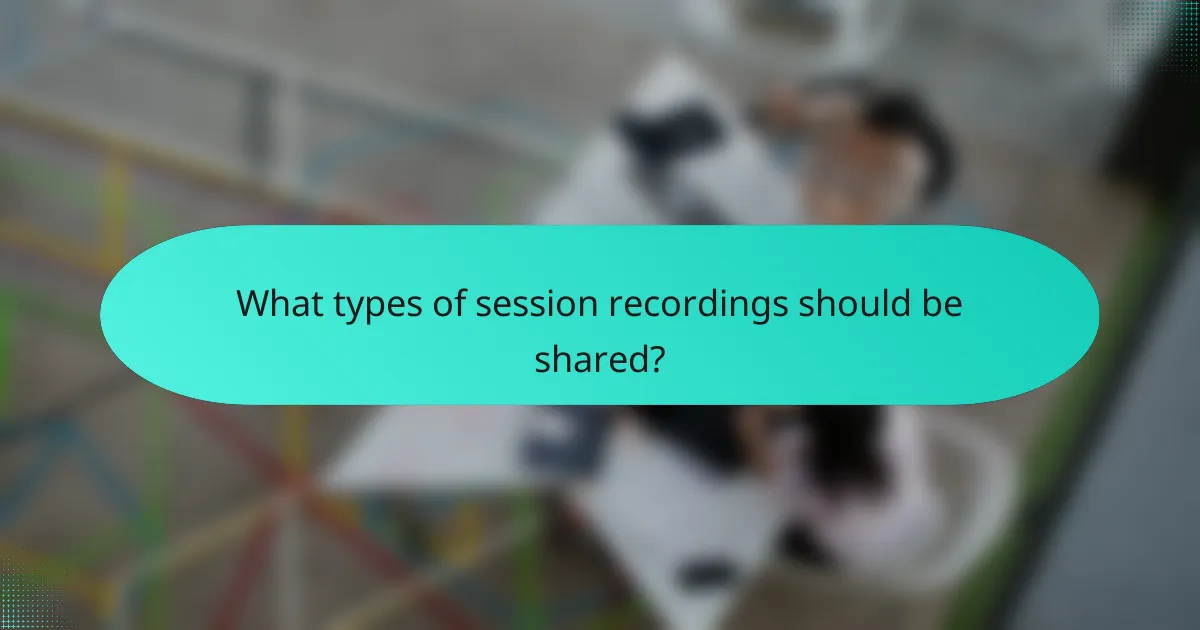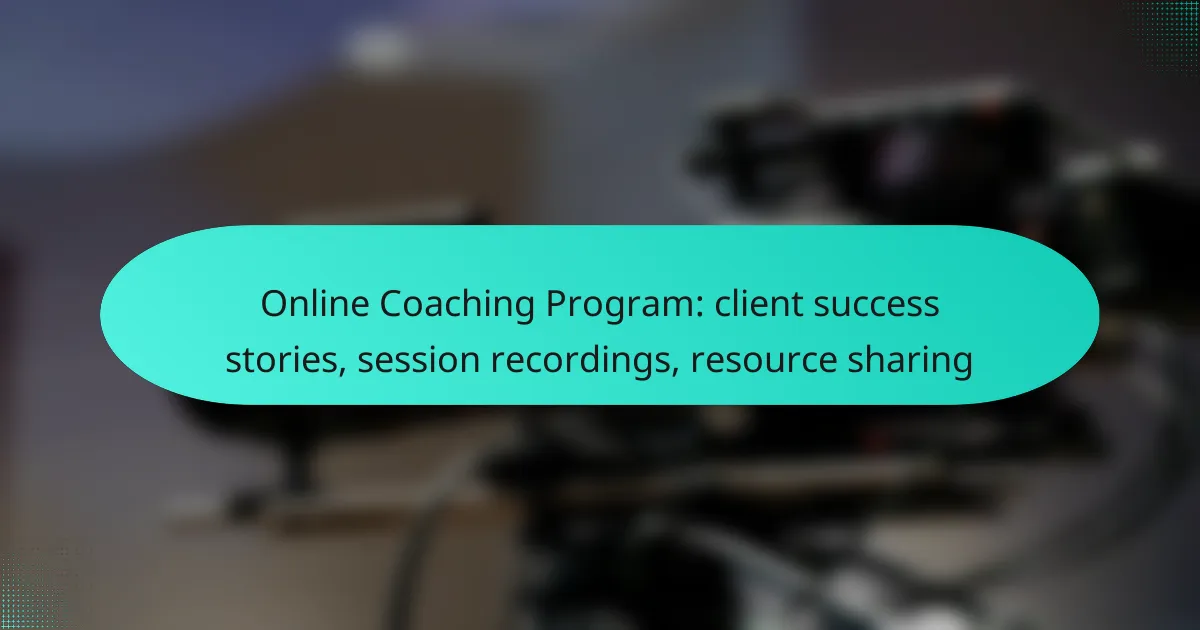Online coaching programs are designed to foster client success through structured support, personalized guidance, and a vibrant community. By utilizing technology, these programs create engaging environments where clients can access session recordings, share resources, and draw inspiration from success stories that highlight the transformative power of coaching.

How can online coaching programs improve client success?
Online coaching programs enhance client success by providing structured support, personalized guidance, and a community of peers. These programs leverage technology to create an engaging learning environment, making it easier for clients to achieve their goals.
Increased accountability
Online coaching programs foster accountability by setting clear goals and deadlines. Clients often report higher motivation levels when they know someone is tracking their progress, which can lead to better outcomes.
Regular check-ins and progress updates help clients stay focused. For instance, weekly sessions can keep participants on track and encourage them to meet their objectives.
Personalized learning experiences
Personalization is a key feature of online coaching, allowing clients to tailor their learning journey. Coaches can adapt content and strategies based on individual needs, ensuring that each client receives relevant support.
For example, a fitness coach might create customized workout plans based on a client’s fitness level and goals, while a business coach may focus on specific skills that align with a client’s career aspirations.
Access to expert guidance
Clients benefit from direct access to experienced coaches who provide valuable insights and strategies. This expert guidance can significantly enhance the learning process, helping clients navigate challenges more effectively.
Coaches often share their knowledge through session recordings, allowing clients to revisit complex topics at their convenience. This resource can be especially useful for reinforcing learning and clarifying difficult concepts.
Community support
Online coaching programs often include community features, such as forums or group chats, where clients can connect with peers. This sense of community fosters motivation and support, as clients share experiences and encourage one another.
Engaging with others facing similar challenges can enhance the overall coaching experience. For instance, clients might exchange tips or celebrate milestones together, creating a supportive environment that promotes success.
Flexible scheduling
Flexibility in scheduling is a significant advantage of online coaching programs. Clients can choose session times that fit their busy lives, making it easier to commit to their coaching journey.
This adaptability allows clients to balance work, family, and personal commitments while still prioritizing their development. Many programs offer on-demand resources, enabling clients to learn at their own pace and convenience.

What are the most effective online coaching platforms in the UK?
Effective online coaching platforms in the UK provide tools for client management, course creation, and live interaction. Popular options include CoachAccountable, Teachable, Thinkific, and Zoom, each offering unique features tailored to different coaching needs.
CoachAccountable
CoachAccountable is designed specifically for coaches, offering features like client tracking, session scheduling, and progress monitoring. It allows coaches to create custom programs and track client engagement, making it easier to manage multiple clients effectively.
One notable aspect of CoachAccountable is its accountability features, which include reminders and goal-setting tools. This can significantly enhance client commitment and success rates. Pricing typically starts at a monthly fee, making it accessible for many coaching professionals.
Teachable
Teachable is a versatile platform that enables coaches to create and sell online courses. It provides a user-friendly interface for course creation, allowing coaches to upload videos, create quizzes, and manage student progress seamlessly.
In the UK, Teachable offers various pricing tiers, which can include transaction fees. Coaches should consider their target audience and course pricing to maximize profitability. The platform also supports integrations with marketing tools, enhancing reach and engagement.
Thinkific
Thinkific is another robust platform for building and delivering online courses. It offers customizable templates and a range of multimedia options, making it easy for coaches to create engaging content. Thinkific also provides tools for marketing and sales, helping coaches attract new clients.
With Thinkific, coaches can offer free trials or paid courses, which can be beneficial for building a client base. The platform’s pricing is competitive, and it includes features like quizzes and certificates, adding value to the coaching experience.
Zoom for live sessions
Zoom is widely used for live coaching sessions, providing a reliable platform for real-time interaction. Its features include screen sharing, breakout rooms, and recording capabilities, making it ideal for both individual and group coaching.
In the UK, Zoom offers various subscription plans, including a free tier with limited session durations. Coaches should ensure they have a stable internet connection and familiarize themselves with Zoom’s functionalities to maximize the effectiveness of their sessions.

How do client success stories enhance coaching programs?
Client success stories significantly enhance coaching programs by showcasing the effectiveness of the coaching process and building a sense of community. These narratives provide tangible proof of progress and inspire both current and prospective clients.
Builds trust and credibility
Sharing client success stories builds trust by demonstrating that the coaching program delivers real results. When potential clients see testimonials from individuals who have achieved their goals, they are more likely to believe in the program’s effectiveness.
Credibility is further enhanced when stories include specific details about the challenges faced and the strategies used to overcome them. This transparency fosters a sense of authenticity that resonates with new clients.
Demonstrates real-world impact
Client success stories illustrate the real-world impact of coaching by highlighting individual transformations. These narratives often detail personal growth, skill acquisition, and improved performance, making the benefits of the program clear.
For example, a client might share how they increased their productivity by 30% after implementing strategies learned during sessions. Such concrete examples help potential clients visualize their own success.
Encourages new clients to join
Success stories serve as powerful motivators for new clients considering joining a coaching program. When they see relatable experiences and successful outcomes, it can prompt them to take action and enroll.
Additionally, featuring diverse success stories can appeal to a broader audience, showing that the program can cater to various needs and backgrounds. This inclusivity can further encourage potential clients to engage with the coaching services offered.

What types of session recordings should be shared?
Sharing session recordings is essential for enhancing client engagement and learning. The types of recordings that should be shared include live coaching sessions, Q&A sessions, and workshops or webinars, each serving distinct purposes in the coaching process.
Live coaching sessions
Live coaching session recordings provide clients with the opportunity to revisit discussions and insights at their own pace. These sessions typically cover personalized strategies and feedback tailored to individual needs, making them invaluable for ongoing development.
When sharing these recordings, ensure they are organized by topic or date for easy navigation. Clients can benefit from reviewing key moments, which can reinforce learning and application of strategies discussed during the live session.
Q&A sessions
Q&A session recordings address common questions and concerns from clients, offering clarity on various topics. These sessions often reveal insights that may not be covered in one-on-one coaching, making them a rich resource for all participants.
Consider categorizing questions by theme or relevance to help clients find answers quickly. Highlighting frequently asked questions can also guide clients to specific recordings that address their immediate needs.
Workshops and webinars
Workshops and webinars are structured sessions that often focus on specific skills or topics relevant to the coaching program. Recordings of these events can serve as comprehensive resources for clients looking to deepen their understanding or acquire new skills.
When sharing these recordings, provide supplementary materials such as slides or handouts to enhance the learning experience. Encourage clients to engage with the content by setting up follow-up discussions or activities based on the workshop themes.

How can resources be effectively shared in online coaching?
Resources can be effectively shared in online coaching by utilizing various digital platforms and tools that facilitate communication and organization. These methods enhance collaboration, ensuring that clients have access to valuable materials and support throughout their coaching journey.
Using dedicated platforms like Slack
Dedicated platforms such as Slack provide a centralized space for communication and resource sharing among coaches and clients. Users can create channels for specific topics, making it easy to organize discussions and share files relevant to each coaching session.
To maximize effectiveness, set clear guidelines for communication and encourage regular check-ins. This helps maintain engagement and ensures that resources are readily accessible when needed.
Creating resource libraries
Resource libraries serve as a repository for essential materials, including articles, videos, and worksheets. Coaches can categorize resources by topic or session, allowing clients to easily find what they need.
Consider using a simple structure, such as folders for each coaching module, to streamline access. Regularly update the library with new materials to keep it relevant and useful for clients.
Utilizing Google Drive for documents
Google Drive is an excellent tool for sharing documents, spreadsheets, and presentations in real-time. Coaches can create shared folders where clients can access important documents, such as session notes and personalized plans.
To enhance collaboration, enable commenting features so clients can provide feedback or ask questions directly on the documents. This fosters a more interactive and engaging coaching experience.
